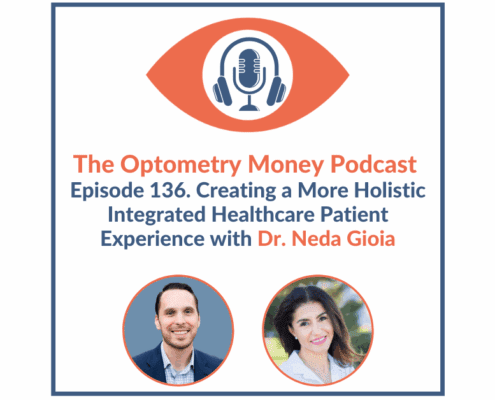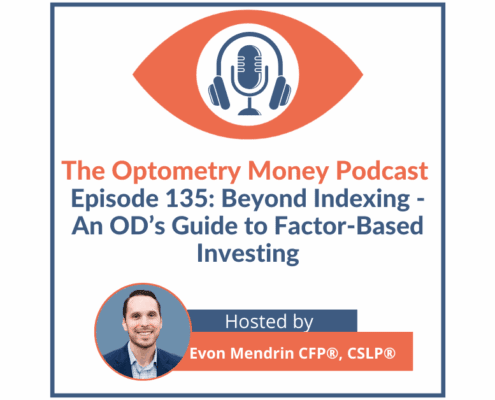The Optometry Money Podcast Ep 109: Investing in Election Years – What History Tells Us About the Stock Market and Elections
What do presidential elections mean for your investments? What actions should you take during an election year?
To provide context for these common questions, Evon dives into the historical behavior of US stocks related to US presidential elections. He dives both into the short-term results – looking at the months and years around the elections, as well as a longer-term perspective. Ultimately, stocks – publicly traded businesses – have rewarded long-term, patient investors over long-term periods of time, regardless of the politician in office.
Have questions on anything discussed or want to have topics or questions featured on the show? Send Evon an email at podcast@optometrywealth.com.
Check out www.optometrywealth.com to get to know more about Evon, his financial planning firm Optometry Wealth Advisors, and how he helps optometrists nationwide. From there, you can schedule a short Intro call to share what’s on your mind and learn how Evon helps ODs master their cash flow and debt, build their net worth, and plan purposefully around their money and their practices.
Resources mentioned on this episode:
- Slides: Market Returns During Elections
- DFA’s Presidential Elections: What Do They Mean for Markets?
- DFA: How Much Impact Does the President Have on Stocks? (Interactive)
- DFA Webcast Highlights: What History Tells Us About Elections and the Market
- A Wealth of Common Sense: Don’t Mix Your Politics With Your Portfolio
The Optometry Money Podcast is dedicated to helping optometrists make better decisions around their money, careers, and practices. The show is hosted by Evon Mendrin, CFP®, CSLP®, owner of Optometry Wealth Advisors, a financial planning firm just for optometrists nationwide.
Subscribe to our podcast below!
Episode Transcript
Episode 109 Transcript – Investing During an Election Year
[00:00:00] Evon: Hey, everybody. Welcome back to The Optometry Money Podcast where we’re helping ODs all over the country make better and better decisions around their money, their careers, and their practices. I am your host, Evon Mendrin, Certified Financial Planner(TM) practitioner, and owner of Optometry Wealth Advisors.
[00:00:21] Thank you so much for listening today. And today’s episode really appreciate your time and attention. And today we’re diving into a topic that’s probably on many of your minds, the presidential election, and it’s almost impossible to avoid the topics since it’s a presidential election year.
[00:00:40] And we have two very, we’ll say animating candidates for presidency this year and our eyes and ears are full of political ads and news, and just other stuff from just about everywhere, all about politics and the election. But we’re not going to talk about politics. I promise. Don’t worry. Don’t worry. We’re going to talk about whether politics should be mixed with your investment decisions. How elections impact our investments. Especially as we navigate through yet another election year. And it’s an unfortunate truth that with elections come a lot of polarization and negativity and really high emotions. And stress and a natural part of that is questions about how elections impact investments.
[00:01:29] Many of these questions carry a sense of fear. Fear of what a certain candidate will do to your investments or fear of not taking action before that happens. Fear of articles you’ve seen on the internet about the certain doom and gloom to come. And my own observation is that whenever there’s something outside of our control, that causes us stress. Much like elections.
[00:01:55] I mean, because ultimately who wins and what their policies will end up being and how that impacts us on a day-to-day life. It’s largely out of our individual control. So my observation is that whenever there’s something outside of our control, that causes us stress we try to go somewhere that is within our control. And I think we feel that our investments are one of those things that are directly within our control, that if only we tinker enough – if only we make trades before – to prepare for the next president we can be better off.and there are again, no shortage of pundits and so-called experts with all sorts of doom and gloom predictions of stock market crashes, regardless of who ends up in office.
[00:02:40] And of course are usually entirely wrong. So rather than think about just my opinion. I want to dive into real data, actual historical data and try to determine whether there is any relevance of presidential elections to our investments and whether we should take action because it’s an election year. So with that, let’s dive on in. And let’s start with the conclusion first.
[00:03:05] All right. I’m going to just going to read to the end of the story here. Here’s the good news. History shows that regardless of which presidential party is in office businesses, stocks have continued to provide a positive return for shareholders over time. So that’s the good news. That’s sort of the conclusion.
[00:03:23] If you had to step away from the podcast and just take one thing, that’s it. Right. So let’s break this down a little bit more.
[00:03:31] Remember That Markets Are Pretty Efficient
[00:03:31] Evon: First. Let’s remember to think about markets as powerful information processing machines. Right. They’re pretty efficient. Like they’re just gobbling up new information as it’s coming in. All of the thousands and maybe millions of investors all over the place are just taking all this information in and applying it to their buying and selling decisions. And the combined impact of millions of investors placing billions of dollars worth of trades each and every day results in market prices that already incorporate sort of the collective expectations of all these investors of what the future of these stocks, these businesses might look like.
[00:04:15] So this makes consistently out guessing the market price pretty difficult. I mean, if we think we have some inkling that a certain. presidential candidates going to do something certain to the stock market. Or they’re going to impact a certain business a certain way. Well, it’s very likely the rest of the market I mean, in aggregate all the other investors, most of which are going to be professional or institutional investors. Are already factoring that into the prices here. Right. So we don’t have any informational advantages.
[00:04:45] How Have US Stocks Behaved the Month of Elections?
[00:04:45] Evon: But let’s, let’s dive into the data here. So let’s look at how US stocks. Here, we’re using the S&P 500.
[00:04:52] So really the, the largest US stocks, but a good enough proxy for this conversation. We’re going to look at how US stocks as shown by the S&P 500. Behaved during actual months of elections. The the months of the elections themselves. And this is probably when the collective emotions of, of everyone are highest right as the elections about to happen.
[00:05:16] And. Data for the stock market, going back to 1926 through 2023. Shows that returns in months when presidential elections are happening – when the actual elections took place – have not tended to be that much different from returns in any other month. There’s no discernible pattern. When, when looking at the returns of the months of elections versus the returns of all other months. If you look at, if you pile up all the returns in the car, look at the distribution.
[00:05:46] There’s really no pattern here. Right? So there is no discernible difference between election months and non-election months.
[00:05:53] How Have US Stocks Behaved During the Year of Elections?
[00:05:53] Evon: Well, let’s zoom out a little bit. All right. So instead of months, let’s take a look at the whole year of the election. So we’ve zoomed out a little bit And this time starting from 1929 through 2023. And while we certainly see ups and downs throughout history. most of the years are positive, which really isn’t different from the historical percentages of all years.
[00:06:15] Most years historically are positive. I’m looking at all of the election years from all the way from Hoover through President Biden. Of the average return of an election year. Is 11.57%. Not bad, right? I mean, that’s pretty much what you would see close to on average anyways. So the, the typical or average experience during a typical or average election year, Is very positive or has historically been positive. Roughly around 11%. And what about the year after the election?
[00:06:51] Because a lot of times we see a new candidate come in. They come in later in the year and we’re expecting them to have an immediate impact on the stock market. Right. We’re saying, Hey, this presidential candidate is in, we know the stock, market’s going to decline the next year. Well, let’s take a look.
[00:07:06] Let’s take a look at the returns of the stock market in the U S. The year after the election. And so the average return of the year after in election year, Has been about 10.67% still pretty positive, and pretty close to the average annual return anyways.
[00:07:23] Right. So , really nothing significant about election years on average.
[00:07:27] How have US Stocks Behaved During Whole Presidential Terms?
[00:07:27] Evon: So when it comes to the years of election and the years after elections, there really isn’t anything significant about those years on average. So now let’s zoom out a little more. How have us stocks behave during the entire term. Of all of these different presidents, right?
[00:07:45] So rather than just the election year or the year after, how has the US stock market behaved during the entire term of these US presidents?
[00:07:55] So again from 1929 through 2023. The average return for a through a whole US presidential term. Was 9.5%.
[00:08:05] Not too bad. Right? When we look at all these different presidents from Herbert Hoover, through all the way through Joe Biden. And when we look at the presidential parties, what we see is realistically there isn’t much of a difference between different parties that are in office in terms of the returns that you see. outside of the great depression, I mean, the great depression was sort of an anomaly there. But outside of the great depression, you don’t really see this discernible pattern, most of them are pretty similar. And within the U S bond market – so leaving from stocks to bonds – we actually see a pretty similar pattern as well.
[00:08:39] No President Has Avoided Double Digit Lossees
[00:08:39] Evon: And what’s interesting going back to the stock market. What’s interesting is that. There also, hasn’t been a president. That has avoided losses either during their term.
[00:08:50] Going all the way back again to Herbert Hoover in 1929. each president has seen a double digit decline during their presidency. with a pretty wide range of declines through the great depression with Hoover was negative 86%, right. Pretty hard to imagine, but we saw negative 86% during the great depression. We saw a negative 51% during, the Bush era.
[00:09:14] we saw negative 16% with Carter is a pretty wide range, but each presidential term has seen its fair share of. double digit, double digit declines. No president has been shielded from that.
[00:09:27] Long Term Returns of Stock Markets Through Presidents
[00:09:27] Evon: And then finally we can zoom out even more, right. Rather than looking at presidential terms, we can look at the longer term average returns. And when we look out even further, We see that the US stock market has provided positive longterm returns, regardless of the different mix of presidential parties throughout history.
[00:09:47] there’s a great chart from Dimensional Fund Advisors and there’s great resources that I’m going to add into the show notes for all these different points I’m making, but there’s a great chart from Dimensional Fund Advisors , showing the longterm returns over time. through different parties in the oval office I’m going to have that in the show notes. But when we look from 1926 through 2023, what we see is that the average annual rate of return for the S&P 500. Was just over 10% when including dividends. Ups and downs along the way.
[00:10:19] Of course, especially in the short term. But what we’ve seen over long periods of time is that stock markets reward long-term investors over time. And this is the real takeaway. You know, unless you are investing specifically for a short-term goal. We’re long-term investors. And we need to keep our point of view, our expectations, our thinking. Over what we expect to happen over decades.
[00:10:44] I mean, our investment time horizons are 20 and 30, 40, 50 years over the rest of our lives. And so we have to keep that in mind, our. Our point of view, when thinking about return expectations and the behavior of these markets. Has to be as a longterm investor.
[00:11:03] And what we’ve seen is that markets have rewarded disciplined patient long-term investors, regardless of the. the politicians in office, Congress, we actually see pretty similar results, regardless of conflicts, regardless of economic events throughout time for those long-term investors who have continued to stay invested patiently, diligently. And especially continuing to invest as those uncomfortable moments are happening. We see that markets have rewarded those investors historically. And while we can’t say, that history is going to guarantee that the same thing happens into the future. History gives us reasonable expectations, a reasonable range of outcomes.
[00:11:51] Conclusions – Remember That You Own Shares of Businesses, not Politicians
[00:11:51] Evon: So, what does this mean for you? Right. Let’s get down to the conclusions again here. What does this mean for you? Well, it’s, it’s critical, it’s crucial to remember what it is you actually own when we’re talking about the stock market. You own either directly or indirectly through mutual funds and ETFs shares of actual businesses. Apple, Disney, Walmart, Home Depot, Toyota.
[00:12:17] I mean, we, we own shares of actual real businesses. You’re invested broadly in businesses and entrepreneurship. And human innovation and ingenuity. Not in presidents and not in political parties. That’s really important. That’s critical. Ultimately businesses will continue to do what they need to do to provide goods and services to customers. Earn a profit and ultimately provide positive returns over time for shareholders. Regardless of what’s happening in the meantime. And they’ll do this regardless of who is in office.
[00:12:53] And also remember that you are likely, especially if you are one of our clients listening. you are likely globally diversified across thousands of publicly traded companies all over the world. And global diversification helps to diversify risks, unique to a particular country or region. Whether it’s economic, whether it’s currency related, political risks, conflicts, wars. Especially long, drawn out declines, unique to one country or region. That’s the purpose that that’s what we want out of global diversification.
[00:13:29] So while politics does tend to be heated topic and we have especially divisive candidates for this election in 2024, mixing politics with investment decisions is very likely going to be a bad decision. Stock markets are way bigger than one man.
[00:13:47] And while presidents can impact policy. And can in some ways impact the economy. Ultimately presidents, in my opinion, get way too much blame when markets decline. And way too much credit when markets are positive. And I think they take too much credit when markets are positive. And when the truth is politicians have far less control over the stock market than most people want to believe. And much of it has to do with the context that the president is stepping into or what’s happening during their presidency that’s actually outside of the control. Bill Clinton and Ronald Reagan took office at opportune times during one of the biggest bull markets in history. And we’ll look at Roosevelt, for example, Roosevelt’s time and office was. started with the great depression and ended in World War II.
[00:14:37] George W bush had 9-11 happened during presidency. And at the end of his presidency, we saw the Great Financial Crisis. Obama stepped in during the Great Financial Crisis kind of timing the bottom. They’re seeing a substantial bull market from there on. We saw COVID happened recently.
[00:14:55] I mean, a lot of this is just the historical context economically or just with, or politically that’s happening around the presidency. As they’re stepping in office. Much of this out of their direct control.
[00:15:08] So as we wrap up today’s episode, I want to leave you with this thought. Stay focused on your long-term investment strategy. And try not to get swayed by the noise of election year rhetoric or really the noise of the headlines any other year. Historically markets have shown resilience and growth throughout various political landscapes. So take a deep breath. Stay the course. Focus on what’s actually within your control, increasing your income, increasing your savings rate, the amount that you are adding, contributing, and investing over time. And trust in the power of markets over the long haul. And with that really appreciate your time.
[00:15:49] I’m going to have all the resources I mentioned in this episode, in the show notes, which you can find at the education hub at my website, www.optometrywealth.com. And while you’re there, please check out all the other resources and episodes we’ve done. As well as feel free to schedule a no commitment introductory call, and we can talk about whatever’s on your mind financially.
[00:16:10] And we can talk about how I help optometrist all over the country solve those same financial concerns and more. And with that, we’ll catch you on the next episode. In the meantime, take care.

RECENT POSTS
- The Optometry Money Podcast Ep 138: The Big Beautiful Bill Act – Tax & Student Loan Reforms Optometrists Need to Watch
- The Optometry Money Podcast Ep 136: Creating a More Holistic Integrated Healthcare Patient Experience with Dr. Neda Gioia
- The Optometry Money Podcast Ep 135: Beyond Indexing – An Optometrist’s Guide to Factor-Based Investing
- The Optometry Money Podcast Ep 134: The Case for Index Funds – Why Optometrists Should Embrace Passive Investing
- The Optometry Money Podcast Ep 133: Strategic Tax Planning Levers in the Optometrist’s Tax Return

 Optometry Wealth Advisors LLC
Optometry Wealth Advisors LLC Optometry Wealth Advisors LLC
Optometry Wealth Advisors LLC Optometry Wealth Advisors LLC
Optometry Wealth Advisors LLC
 Optometry Wealth Advisors LLC
Optometry Wealth Advisors LLC Optometry Wealth Advisors LLC
Optometry Wealth Advisors LLC